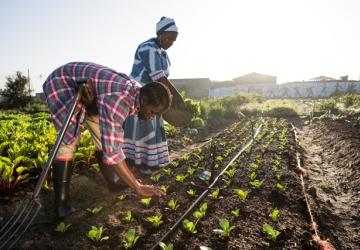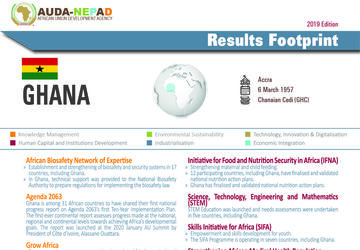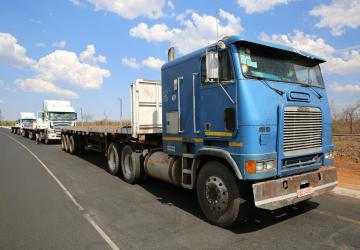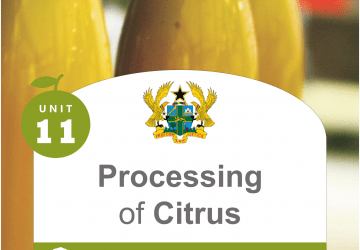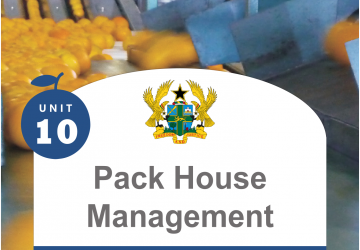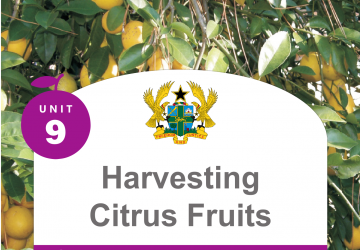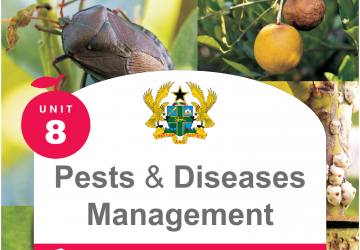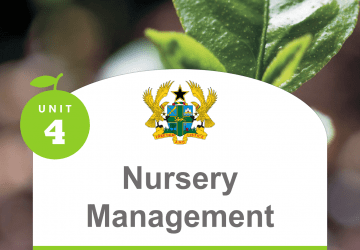 Ghana
Ghana
Official Name: Republic of Ghana
Capital: Accra
Independence Day: 6 March 1957
Currency: Ghanaian Cedi (GHC)
Key Result
6,700 women were reached through the NEPAD-Spanish Fund for the Empowerment of African Women through the disbursements of grants. The REPAO (Le Réseau sur les Politiques de Pêche en Afrique de l’Ouest) project, for instance, strengthened the organisational, technical and financial capacity of women working in the fisheries industry in West Africa. To this end, the project assisted the women in meeting the challenges of marketing quality products, obtaining access to international markets and improving sustainable livelihoods in fishing communities.
The Council of Technical Vocational Education and Training (COTVET), as the responsible national body in Ghana, is championing Agriculture Technical Vocational Education and Training (ATVET). As a result, ATVET has been incorporated into the Ghana National Medium-term Agriculture Sector Investment Plan (METASIP II) as part of CAADP processes and structures.
Following a training needs assessment, important skills required in the value chains of pineapple and citrus production were identified and incorporated into a new curricula. This was done in close cooperation with public and private stakeholders. Curricula have been designed to equip trainees to venture into agriculture as a business and to encourage them to become involved in agricultural enterprises along the value chains, aligned with Ghana’s National Qualification Framework (NQF). As a result a TVET NQF has been developed with the aim of obtaining accreditation for ATVET at selected institutions.
Ghana also benefitted from setting-up of a functioning biosafety system for field testing of genetically engineered rice, cowpea, cotton and sweet potato. Networking among African regulators and policy makers has shown the benefits of cross-country experience sharing. As a result, Ghana was able to move straight to multi-location testing of cotton by using data portability from Burkina Faso. In turn, Ghana’s experience with multi-location testing is being shared with other countries through various consultations.
The African Institute for Mathematical Science (AIMS) based in Ghana has produced 106 graduates.
Ghana has two designated Regional Centres of Regulatory Excellence (RCOREs) specialising in Pharmacovigilance and medicines registration and evaluation and clinical trials oversight. RCOREs are institutions with specific academic and technical regulatory science expertise and training capabilities capable of producing regulatory workforce in Africa.
The continent has a target of committing 100 Million hectares of land for restoration through the application of the restoration opportunities assessment methodology. To-date, Ghana has committed 2 million ha.
Ghana signed the CAADP Compact in 2009 committing to prioritise agricultural transformation and development. Technical experts were deployed to Ghana from 4 - 9 June 2010 to undertake independent technical reviews by the NEPAD Agency. Ghana is now in advanced stages of implementing its National Agriculture Investment Plan (NAIP).
The country received financial support through the Sahel and West Africa Program (SAWAP) to the tune of USD13.25 million for enhancing sustainable land and water management.
The cost of hunger in Ghana was estimated at USD2.6 billion, with the aim to catalyse coordinated action and inform the design of nutrition-oriented policy frameworks and programmes, with greater investments to eradicate child under-nutrition on the continent.
Related
Projects
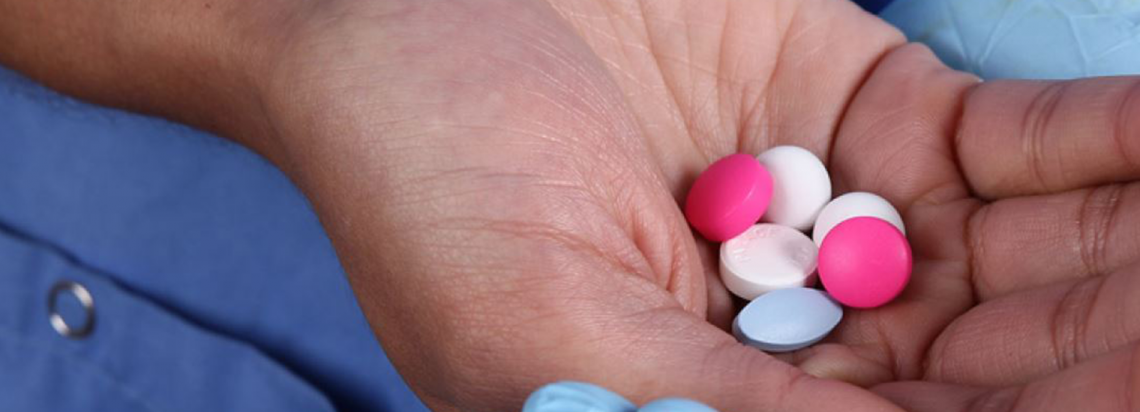
A critical AU Model Law aimed at harmonizing medical products regulatory systems in Africa was endorsed by African Heads of State and Government at the January 2016 AU Summit in Addis Ababa, Ethiopia. The AU Model Law will contribute towards accelerate the regulation of safe, quality and affordable medical products and technologies in Ghana.
The West Africa Medicines Regulatory Harmonization (MRH) programme was launched in 2015 in Accra, Ghana. Ghana participated in the establishment of the joint MRH Project Steering Committee and formation of 7 Technical Working Groups (TWG’s). The TWG’s are tasked with developing technical guidelines of the MRH programme. In addition, a joint framework of collaboration between WAHO and WAEMU has been agreed upon.
Ghana has two designated RCORES specializing in Pharmacovigilance and medicines registration and evaluation and clinical trials oversight: University of Ghana Medical School – WHO Collaborating Centre for Advocacy and Training in Pharmacovigilance; and Foods and Drugs Authority (FDA) of Ghana respectively. RCOREs are institutions with specific academic and technical regulatory science expertise and training capabilities capable of producing regulatory workforce in Africa.



Undertook the Measuring the Cost of Hunger in Africa: Ghana was among the second phase countires (Burkina Faso, Ghana, Malawi, Rwanda) to implement the COHA study. The overarching objective of the multi-country study led by the AUC, NEPAD, WFP and UNECA, is to catalyse coordinated action and inform the design of nutrition-oriented policy frameworks and programmes, with greater investments to eradicate child undernutrition on the continent.
10 findings from the “Measuring the Cost of hunger” study in the first and second phase countries:
- Africa's share in the world's undernourished population has increased from 18 to 28 percent.
- Only one in five children suffereing from undernutrition occur before the child reaches the age of one year.
- Most health costs associated with undernutrition occur before the child reaches the age of one year.
- Between 7 to 18 percent of repetitions in schoold are associated with stunting.
- Stunted children achieve 0.2 to 1,5 years less in school edication.
- 8 to 33 percent of all child mortality is associated with undernutrition.
- Child mortality associated with undernutrition has reduced national workforces by 1 to 13.7 percent.
- 40 to 67 percent of current working-age population suffered from stunting as children.
- The annual costs associated with child underbutrition are estimated at 1.9 to 16.5 percent of the equivalent of Gross Domestic Product (GDP).
- Improving the nutritional status of children is a priority that needs urgent policy attention to accelerate socio-economic progress and development in Africa.
Undertook the Measuring the Cost of Hunger in Africa: Ghana was among the second phase countires (Burkina Faso, Ghana, Malawi, Rwanda) to implement the COHA study. The overarching objective of the multi-country study led by the AUC, NEPAD, WFP and UNECA, is to catalyse coordinated action and inform the design of nutrition-oriented policy frameworks and programmes, with greater investments to eradicate child undernutrition on the continent.
10 findings from the “Measuring the Cost of hunger” study in the first and second phase countries:
- Africa's share in the world's undernourished population has increased from 18 to 28 percent.
- Only one in five children suffereing from undernutrition occur before the child reaches the age of one year.
- Most health costs associated with undernutrition occur before the child reaches the age of one year.
- Between 7 to 18 percent of repetitions in schoold are associated with stunting.
- Stunted children achieve 0.2 to 1,5 years less in school edication.
- 8 to 33 percent of all child mortality is associated with undernutrition.
- Child mortality associated with undernutrition has reduced national workforces by 1 to 13.7 percent.
- 40 to 67 percent of current working-age population suffered from stunting as children.
- The annual costs associated with child underbutrition are estimated at 1.9 to 16.5 percent of the equivalent of Gross Domestic Product (GDP).
- Improving the nutritional status of children is a priority that needs urgent policy attention to accelerate socio-economic progress and development in Africa.
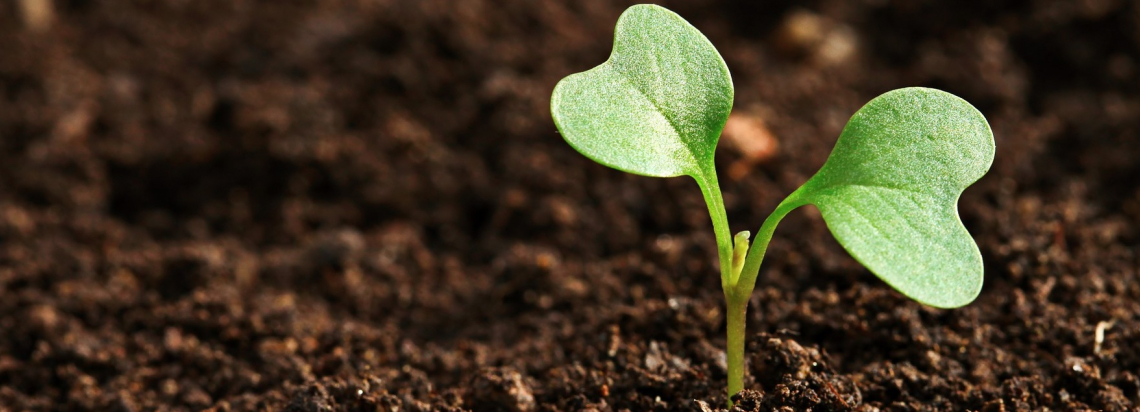
CAADP Compact: Ghana signed the CAADP Compact on 27 - 28 October 2009.
Capacity Building: Technical experts were deployed to Ghana from 4 - 9 June 2010 to undertake independent technical reviews of its National Agricultural Investment Plans (NAIPs). Ghana is now in advanced stages of implementing its NAIP, including its review to ensure adequate focus on aspects such as agriculture and climate-change, fish and aquaculture, food and nutrition security, risk management, and youth development
Ghana also received support on an agriculture expenditure study and capacity assessments were undertaken.
Business: In June 2010 the NEPAD Agency facilitated Ghana’s first Business Meeting from 14 - 17 June 2010.
AGRIBUSINESS AND AGRIFINANCE Project - Click here for more information


Project : TAH programme
Description : This is phase I of the continental connectivity programme that focuses on completion and standardisation of the TAH missing links by 2030
Project : Single African Sky phase 1 (design and initial implementation)
Description : Single African Sky is a continental programme that will create a high-level, satellite-based air navigation system for the African continent
Project : Yamoussoukro Decision implementation
Description : Accelerate Yamoussoukro Decision implementation by identifying countries that are ready to fully implement it, and discussing and agreeing with both their governments and airlines to launch the voluntary club on a full membership basis
Project : ICT Enabling Environment
Description : This programme would improve the environment for the private sectors to invest in high-speed broadband infrastructure
Project : ICT Terrestrial for Connectivity
Description : This programme has two main components : secure each country connection by at least two broadband infrastructure and ensure the access to submarine cable to all landlocked countries
Project : Internet Exchange Point (IXP) programme
Description : The aim of this programme is to provide Africa with adequate internet node exchange to maximise internal traffic
Project : West Africa Power Transmission Corridor
Description : 2,000 km line along the coast connecting with the existing Ghana– Nigeria line with a capacity of 1,000 MW
Project : Abidjan-Lagos Coastal Corridor (DFS)
Description : This programme would modernise the most heavily travelled ARTIN corridor in West Africa (trade facilitation, OSBPs, capacity enhancement and implementation of PPP)
Project : West Africa Hub Port and Rail Programme
Description : This programme aims at responding to the future capacity problems in West African ports. This programme has two components : (a) a regional hub port and rail linkage master plan and (b) port expansion
Project : West Africa Air Transport
Description : This programme aims at increasing the air transport service levels in West Africa, which are currently limited by the lack of a regional air hub
Project : Noumbiel
Description : Multipurpose dam with hydropower generation (for Burkina Faso and Ghana) component

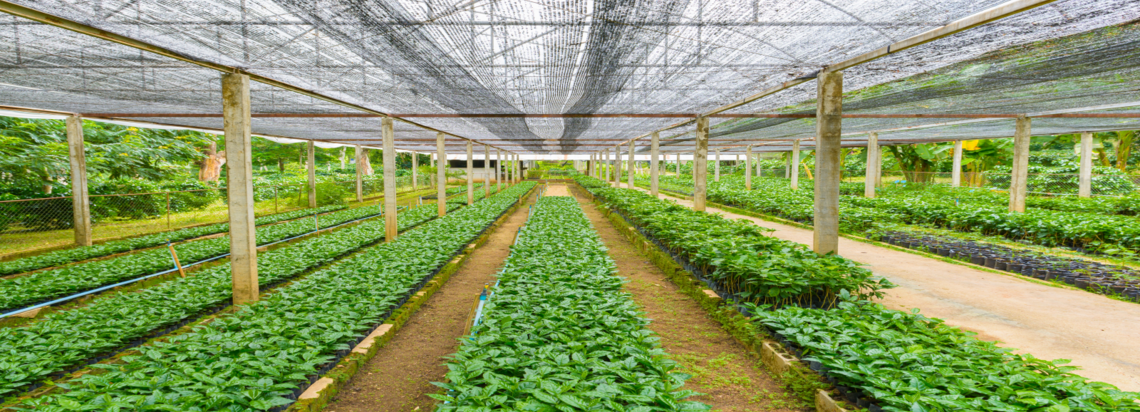


Networking among African regulators and policy makers has shown the benefits of cross-country experience sharing. Ghana was able to move straight to multi-location testing of cotton by using data portability from Burkina Faso. In turn, Ghana’s experience with multi-location testing is being shared with other countries through various consultations.
Technical capacities were also strengthened to establish and manage functional biosafety systems for the safe use of modern agricultural biotechnology. Other technical support included national biosafety training workshops, biosafety short courses at African institutions and partner institutions outside Africa, notably at Michigan State University in the USA, biosafety internships, technical consultation support, and biosafety information resources.
•Project Name: Fund-raising and grant making initiative to support African women’s movement (disburses small grants to women groups in West, East, and North Africa for various activities) - African Women Development Foundation (AWDF) - Promoting Participation of Women in Decision Making and Leadership
•Project Name: Réseau sur les Politiques de Pêche en Afrique de l’Ouest (REPAO).
Results:
•Supported REPAO trained women in the fishery sector in the certification process and marketing
•Project Name: Fund-raising and grant making initiative to support African women’s movement (disburses small grants to women groups in West, East, and North Africa for various activities) - African Women Development Foundation (AWDF) - Promoting Participation of Women in Decision Making and Leadership
•Project Name: Réseau sur les Politiques de Pêche en Afrique de l’Ouest (REPAO).
Results:
•Supported REPAO trained women in the fishery sector in the certification process and marketing
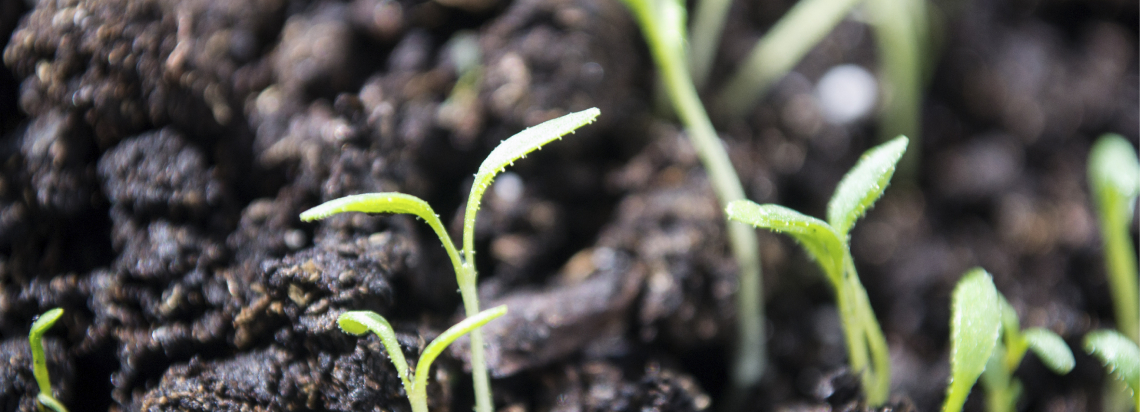
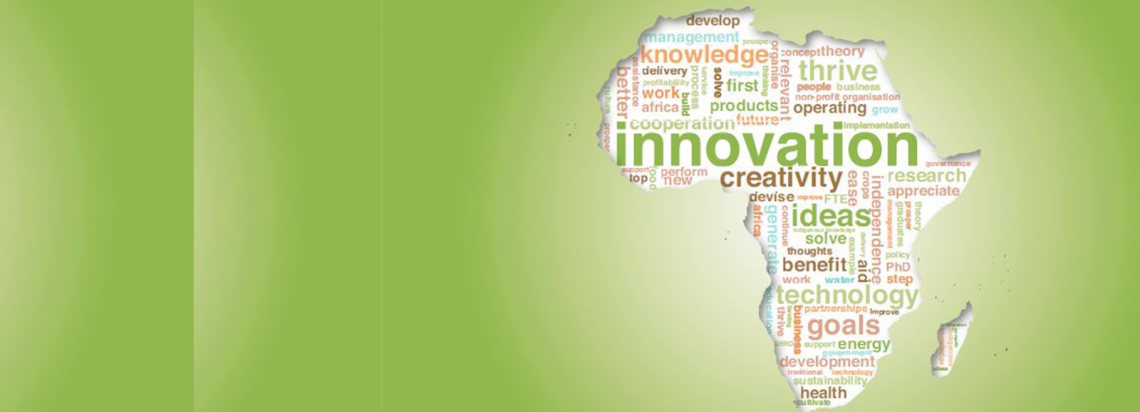

Results (2013 – 2015)
Advocacy and Strengthening of Negotiation Capacities on Post-2015 Development Agenda through the Common African Position (CAP):
• The multi-stakeholder framework of engagement specifically enhanced dialogue towards ensuring the required mass to influence the Post-2015 Global Agenda and Development Goals relevant to the Continent;
• This intervention helped strengthen country and regional level negotiating capacities for the effective incorporation and articulation of Africa’s priorities as enshrined in CAP in the final Global SDGs;
• The project enabled the participation of African stakeholders at the Means of Implementation Engagement, 3rd Financing for Development Conference and the UN General Assembly that adopted the new SDGs. This ensured the incorporation of Africa’s development priorities into the new goals through developing essential negotiation capacities;
• Through the CAP/SDGs space on the Africa Platform for Development Effectiveness (APDev), knowledge products and negotiation documents, as well as, policy briefs where successfully disseminated to the African negotiators in New York and kept the continent’s stakeholders informed of the overall process;
• Development and dissemination of post-2015 Policy Briefs on “Financing and Partnerships” and “Structural Economic Transformation and Inclusive Growth”. These are priorities outlined in the CAP and the policy briefs where utilized in the negotiation process for the African continent.
Global Partnership for Effective Development Cooperation (GPEDC):
• Africa secured the hosting of the 2nd High Level Meeting (HLM) of the Global Partnership. This was attained through robust negotiation and facilitating a common voice from Africa with regards to this critical engagement by the NEPAD Agency. The 2nd HLM will be held in Nairobi Kenya;
• The NEPAD Agency advocated for the full inclusion and participation of Africa’s Regional Economic Communities (RECs) in conducting the 2nd GP Monitoring Exercise. This was a fundamental achievement considering the RECs are the continent’s building blocks with regards to socio-economic transformation;
• The Africa Action Plan on Development Effectiveness (AAP) was granted the status of an official Global Partnership Initiative (GPI) at the Planning Meeting in Brussels. The AAP was developed by the NEPAD Agency in consultation with African multi stakeholders. This has enabled the Agency to successfully mobilize resources towards the implementation of the AAP.

Project : Gas – West African Power Pool: Domunli Regional Power Project
Countries/Region : Ghana, Benin, Togo, Nigeria | West Africa
Project Location : Located in the Western Region of Ghana, near the Ghana Gas processing plant facility
Sector/Subsector : Energy/Generation
Project Description : Construction of a 450 MW combined cycle thermal power plant, which seeks to make use of the Jubilee gas fields. This is a Government of Ghana/Volta River Authority (VRA) (Ghana’s national utility for generation and supply) sponsored project located in Domunli in the western region of Ghana.
Project : Gas – West African Power Pool: Maria Gleta Regional Power Project
Countries/Region : Ghana, Benin, Togo, Nigeria | West Africa
Project Location : Near the border between Porto Novo and Cotonou cities, Benin
Sector/Subsector : Energy/Generation/Transmission
Project Description : Construction of a 450 MW combined cycle power plant: one is set to comprise two gas turbines with a rated output of about 150 MW each, and the other a steam turbine with a rated output of about 150 MW, bringing the total output to 450 MW.
Project : Gas – Ghana 1000 LNG to Power Project
Countries/Region : Ghana | West Africa
Project Location : Western Ghana
Sector/Subsector : Energy/Generation
Project Description : Construction of an integrated liquefied natural gas (LNG) to power plant, generating in excess of 1,300 MW of electricity to Ghana’s national power grid.

Description : The use of political gravitas and goodwill to unblock and facilitate political bottlenecks affecting the implementation of ICT broadband and optic fibre projects on the continent

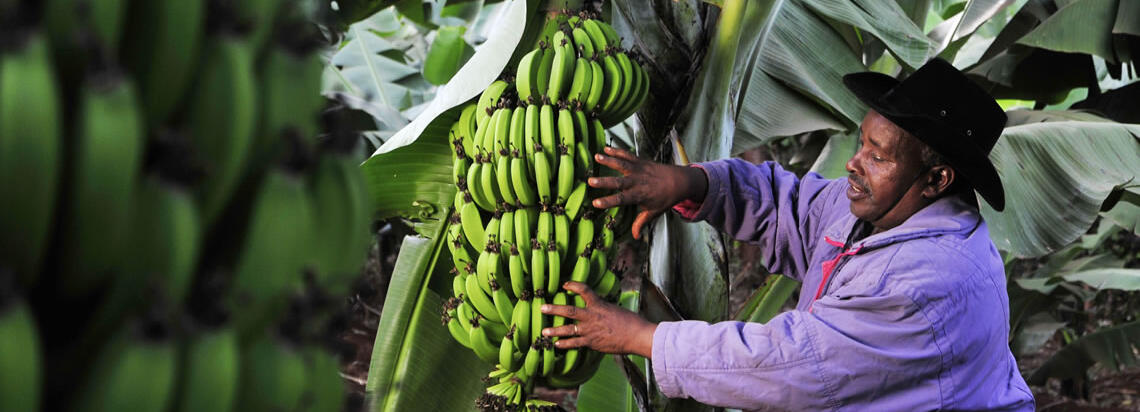
New Alliance for Food security and Nutrition and Grow Africa Partnerships: 20 LOIs from 8 domestic companies and 12
international.
• $132,223,650 of planned investment.
• $14,877,879 reported as invested in 2014, making
a cumulative total of $48,402,212 to date.
• 742,947 smallholders reached in 2014
• 2,416 jobs created in 2014.
• $192 million donor disbursements in 2014 (41%
of expected).
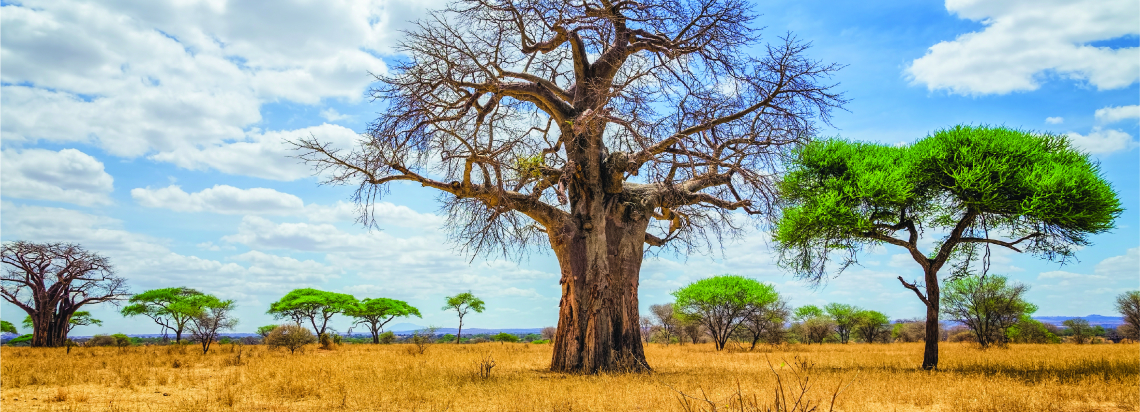
- Ghana, with the help of TerrAfrica partners, particularly the World Bank, managed to develop its draft investment framework for SLM, the Ghana Sustainable Land Management Investment Framework (GSIF). The final draft of the GSIF underwent preliminary review in November 2009. Several activities informed the development of the GSIF. These include literature reviews, field consultations with relevant stakeholders and conducting four analytical studies on: Land degradation assessment using Geographical Information Systems (GIS), Sustainable Land Management (SLM) Technologies Assessment, Baseline Studies; and Resource Mobilization, in all the six ecological zones of Ghana. Institutional arrangements for the implementation of the National Action Programme (NAP) to combat desertification and drought were also established and are functional at three levels to implement the Ghana Environmental Management Project (GEMP).These same institutional arrangements were also proposed in the GSIF.
- Resulting from the development of the CSIF, Ghana was then able to align stakeholders and resources towards the implementation of The Sustainable Land and Water Management project. In the long term, this project will contribute to efforts directed at reducing land degradation; enhancing maintenance of biodiversity in selected micro-watersheds, and identifying potential linked watershed investments in the Northern Savannah region of Ghana.
- Having the shared aim of reducing land degradation, The Sahel and West Africa Program (SAWAP) supported The Sustainable Land and Water Management project in Ghana to the tune of $13.25M).
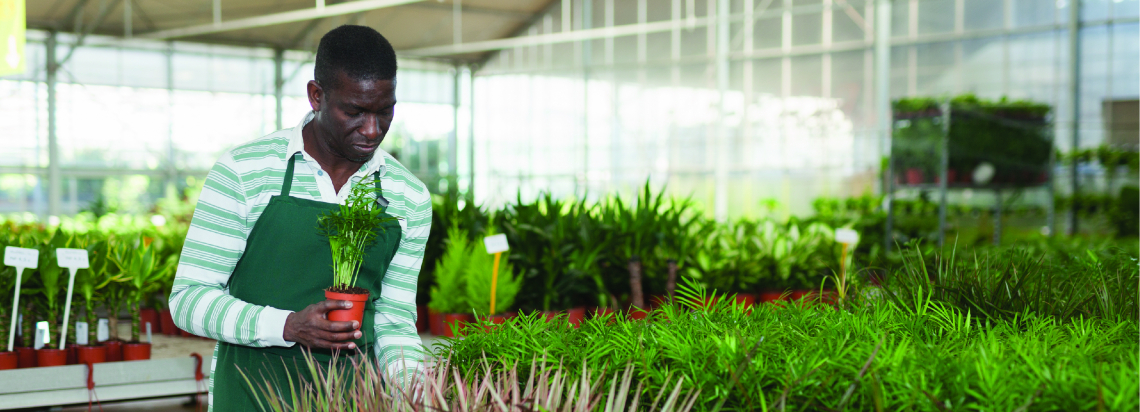
The Council of Technical Vocational Education and Training (COTVET), as the responsible national body in Ghana, is championing the Agriculture Technical Vocational Education and Training (ATVET) project.
The Ghana National Medium-term Agriculture Sector Investment Plan (METASIP II) has incorporated ATVET to ensure adequate attention at the national level with regard to embedding it in the CAADP structures and processes in the country.
A stocktaking exercise was successfully conducted. Based on the outcomes of this exercise, six ATVET institutions were selected for their potential in the areas of human capacity development and organisational development.
Following the training needs assessment, important skills required in the value chains of pineapple and citrus production were identified and incorporated into the new curricula. This was done in close cooperation with public and private stakeholders. Furthermore, new training material was developed with a particular focus on Competence Based Training (CBT). The material was introduced at four pilot institutions (three public and one private).
These training centres are being upgraded to accommodate quality management systems, highly trained and motivated staff, and the two demand-driven curricula on pineapple and citrus value chains. The intake of the selected training institutions has increased significantly.
Curricula are designed to equip trainees to venture into agriculture as a business and to encourage them to become involved in agricultural enterprises along the value chain. Therefore, all steps from production, processing and marketing are included. In order to align the curricula with the Ghana’s National Qualification Framework (NQF), these curricula will have to be recognised by COTVET. Ghana has established a TVET NQF by law, with the aim of obtaining accreditation for ATVET at the selected institutions.
Furthermore, the training of 570 farmers from 19 communities by Farmer Business Schools (FBS) has been supported, with a female participation rate of 30%.
Some 382 trainees, including farmers, have undergone training in the revised curricula of the two value chains, i.e. training of the trainers in postharvest handling and the internal verification of CBT.

"At the beginning of 2014, 37 of the 42 opted-in African countries have completed a rapid assessment / gap analysis. The next step for countries is to develop a SE4LL Action Agenda and Investment Prospectus(es). To support this process, the SE4ALL Africa Hub partners have led the development of Africa Guidelines for SE4ALL national Action Agendas. The Africa Guidelines lay out principles and process for developing Action Agendas and put forward a balanced approach of centralized and decentralized solutions to achieve universal access to energy services.
Progress in Ghana:
Developed and approved a SE4All Action Plan in 2012, the frst country to do so in Africa, identifying a SE4All focal point and Secretariat. The Action Plan preceded the standardization of the SE4All country action process, and is being transformed into an Action Agenda harmonised with the rest of region"
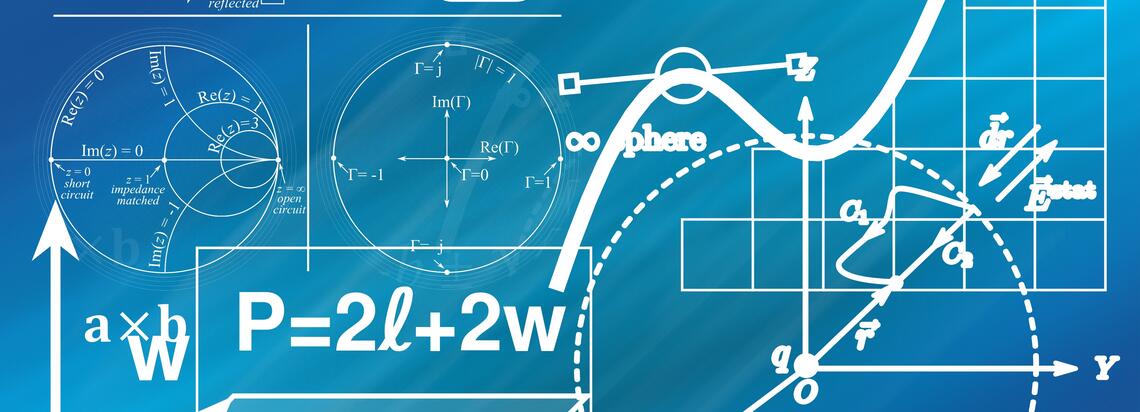
Project: AIMS-Ghana
Decsription: AIMS Ghana is part of a pan-African network of centres of excellence for postgraduate education, research and public engagement in mathematical sciences. AIMS presently has five centres in Africa; South Africa, Sénégal, Ghana, Cameroon, and Tanzania.
Country Results:
To date, AIMS Ghana has produced 106 graduates,
twelve females and Twenty-eight males drawn from sixteen African countries,
Project Results:
AIMS-Ghana is a center for education, research and outreach in Biriwa, Ghana. AIMS-Ghana is a partnership project of the University of Cape Coast, University of Ghana, Kwame Nkrumah University of Science and Technology, Ghana Academy of Arts and Sciences, Herriot Watt University, Durham University, and Nanyang Technological University. The Centre was launched in August, 2012 as part of the AIMS-Next Einstein Initiative, a coordinated programme to launch 15 AIMS centres across the continent; an ambitious plan which has won support from the Governments of Ghana, Senegal, Cameroon, Tanzania and Canada; international companies such as Google, Mastercard, and Blackberry, and recently won the Project 10^100 competition, selected as one of 5 winners out of 150,000 entries.
AIMS is already making a big difference: since 2003, 731 students – 30% of them women – from 41 African countries have graduated from AIMS. Over 80% have gone into Master's and PhD programs directly after AIMS at excellent universities in Africa and abroad. AIMS graduates are now strengthening African universities, research centers, government and industry. For example, many of the mathematics lecturers at the Universities of Zambia and Khartoum are AIMS graduates and are now in turn educating hundreds of students each year. Among the AIMS graduates: 55 have completed PhDs, 233 completed Research Master’s, and many more are in the process of completing similar post-graduate programs".
you agree to the AUDA-NEPAD Privacy Policy.




![[GHANA] Campaign for the Enhanced Domestication of the Science, Technology and Innovation Strategy for Africa - STISA-2024](/sites/default/files/styles/360_250/public/thumbnail/STISA%20cover.jpg?itok=oN_IEv2n)
